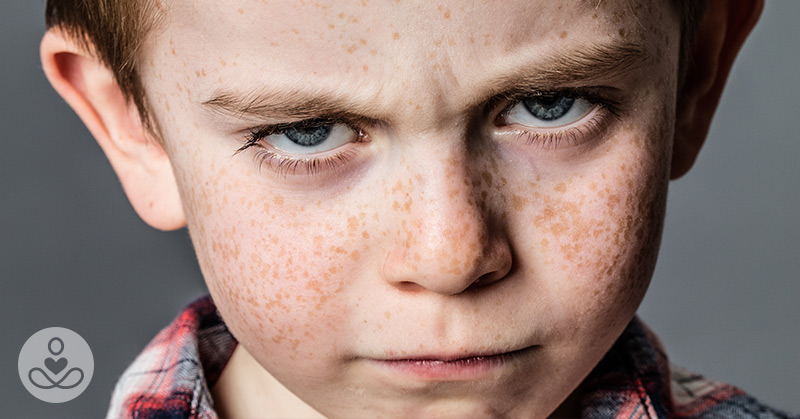I was a nanny for seven years and have never heard of oppositional defiant disorder. I’ve taken care of children from six months old to twelve and even older, and while I’ve had my share of disagreements with my kids, I don’t know if anything I experienced would classify as oppositional defiant disorder.
A Mother’s Experience With ODD

Colleen Dilthey Thomas blogged on ScaryMommy.com about her experience with her son’s oppositional defiant disorder (ODD). She shares it first began with a disagreement over her son putting away his laundry—something she summed up to her son having a bad day, his age, his growing independence. But then, she says his defiance began happening “all the time”. The fights and rage her son instigated turned into him telling her “you hate me” and “you don’t love me and I don’t love you”, things no parent (or caregiver) ever wants to hear. Thomas shared the disagreements ranged from being over quickly to dragging on all day.
Her son’s out-of-control behavior eventually led to professional help.

Thomas shares her son already has attention deficit hyperactive disorder (ADHD), a disorder most caregivers are familiar with where kids are easily distracted, hyperactive, and impulsive [1]. The doctor shared that Thomas’ son was exhibiting textbook-case behavior of oppositional defiant disorder (ODD), something children with ADHD are at increased risk to have.
Yes, ODD Is an Actual Disorder

Oppositional defiant disorder is real, but there’s a difference between children who are stubborn and emotional and those with ODD. Growing up is hard, and it’s normal for kids to oppose their parents, especially as they age. However, kids with ODD usually begin exhibiting symptoms as preschoolers (anywhere from 2-5 years old), but may start having symptoms later, but almost always before the early teen years (generally speaking, ages 11-14 years old) [2].
Children with oppositional defiant disorder may have behaviors that impair their school, work, social, and family life.

The following symptoms must be present for at least six months before ODD can be considered as a diagnosis:
- Loses temper often and usually over trivial matters; maybe easily annoyed
- Is angry, argumentative, blameful
- The child may refuse to comply with rules from parents or teachers
- The child may deliberately upset people
- The child may be spiteful or vindictive
There are also different severity levels of ODD, ranging from mild (symptoms occurring in just one setting, such as at home) to moderate (two settings) to severe (three or more settings). In addition, ODD is more common in boys than in girls.
How to Know If It’s Really ODD (and Risk Factors)

Seeking the professional opinion of a child psychologist or physiatrist can help you know if your child’s behavior is the result of oppositional defiant disorder. Some risk factors include children who have been abused or given harsh discipline, children who have a lack of parental supervision, and children who are very emotional and have trouble regulating their emotions.
Children who have family issues such as a parent with substance abuse or mental health disorders are also more likely to show symptoms of ODD, as are children who get attention from their peers for acting out with a lack of structure or discipline from teachers and parents. In addition, it’s common for children with oppositional defiant disorder to have other disorders such as depression, anxiety, ADHD, and even learning disorders. Treating these disorders may help with ODD symptoms, and vice versa, ODD may be harder to treat without managing the other disorders [2].
What Causes Oppositional Defiant Disorder?

It’s not exactly known what causes ODD, although some experts speculate that different experiences throughout a child’s development can lead to the disorder. This could include ineffective parenting which can lead to problems with authority figures and negative peer interactions. As these experiences continue, they can lead to a pattern of behavior that experts would call ODD [3]. Others say that abuse or instability at home can contribute to the development of ODD in children, similarly to the risk factors we discussed above.
Why Seeking Treatment for ODD Is Important

Children with ODD often struggle to maintain stable relationships and keep up their performance at school or work. These effects can continue throughout their adult lives. They may be impulsive, more likely to use substances, and even have an increased risk for suicide. Kids with ODD like to choose a target, according to Thomas, so as a parent, caregiver, or teacher, you may be on the receiving end of the child’s anger.
Kids with ODD will push parents to extremes that can actually reinforce the child’s negative behavior, as these patterns only serve to show the child that their actions are effective, or having the desired result [4]. Typically, early intervention can prevent ODD from getting worse, and positive parenting can help as well. Treatment for ODD can build up your child’s self-esteem and improve their relationships with others, including you, and can have positive effects as they enter adulthood.
How Is Oppositional Defiant Disorder Treated?

Fortunately, ODD can be treated, and generally the earlier you begin treatment, the better. Different types of therapy including cognitive-behavioral therapy, family therapy, and peer group therapy may help. Therapy can give a child a better way to control their anger, help a family become more functional and communicative, and encourage healthy relationships with your child among their family and peers [5]. Therapy can also help your child learn and use tools to better control their emotions, uncover underlying disorders, and tackle problems in a healthy way rather than through anger and opposition.
Medications are not typically used to treat or manage oppositional defiant disorder, although your child may have other conditions that may call for the need to consider medication in order to better manage underlying causes or contributing factors to ODD. Children may outgrow ODD, but some children will learn behaviors that they carry with them into adulthood, which is why treatment now is so important!
How Can You Help a Child Who Has ODD?

Being a parent is already a challenging job. Parents or caregivers who live with a child with ODD can experience even more challenges. In addition to seeking therapy for your child, here are a few other ways you can help [6]:
- Utilize positive reinforcement. When your child cooperates, praise them. Try to give attention for positive behaviors as much as possible.
- Check your stress. If you feel you’re about to make things worse, take a break. Manage your own stress, which may include exercise and relaxation.
- Be a model for your child. This is especially true when it comes to managing anger, stress, or emotions. Show them it’s healthy to take a break and take care of yourself.
- Prioritize. Choose your battles! Your child will have trouble avoiding power struggles—focus on the things that really matter.
- Set appropriate limits. And always stick to consequences you can consistently enforce.
- Set up a support system. Other parents who may have kids with ODD, teachers, coaches and your spouse can all help you get through this.
You can successfully help a child with ODD. It’ll be challenging, no doubt, but by leveraging the right tools and resources, you can ensure your child has a healthy, stable life and overcomes ODD with the right help.
Sources
- https://kidshealth.org/en/parents/adhd.html
- https://www.mayoclinic.org/diseases-conditions/oppositional-defiant-disorder/symptoms-causes/syc-20375831
- https://www.stanfordchildrens.org/en/topic/default?id=oppositional-defiant-disorder-90-P02573
- https://childmind.org/article/what-is-odd-oppositional-defiant-disorder/
- https://www.hopkinsmedicine.org/health/conditions-and-diseases/oppositional-defiant-disorder
- https://www.aacap.org/AACAP/Families_and_Youth/Facts_for_Families/FFF-Guide/Children-With-Oppositional-Defiant-Disorder-072.aspx
- https://www.scarymommy.com/son-has-oppositional-defiant-disorder/

